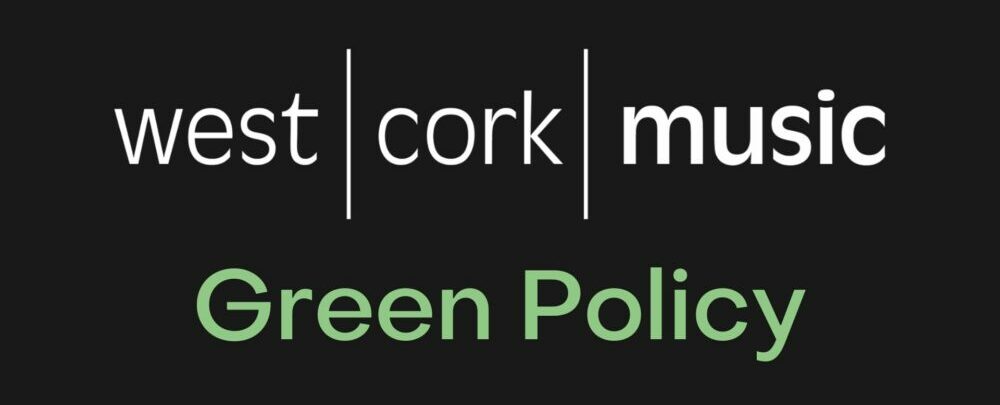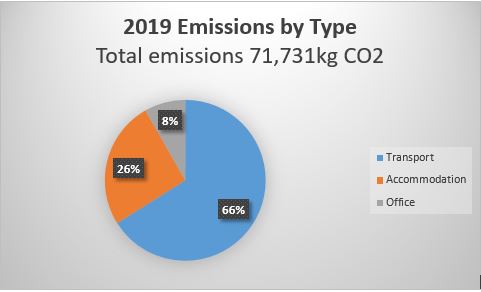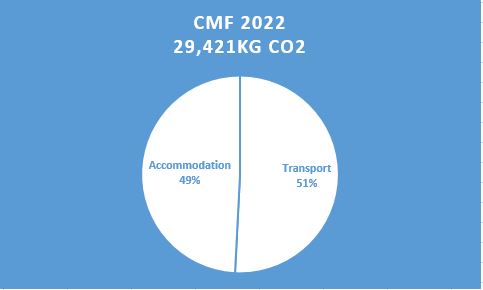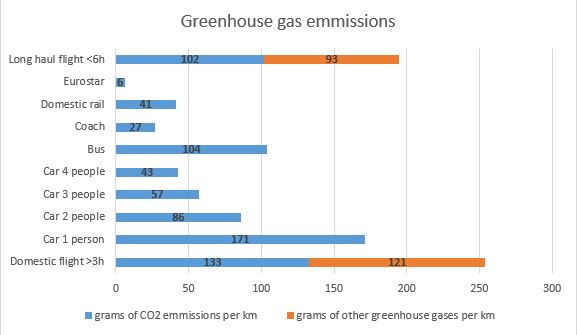

West Cork Music is committed to reducing the impact of our work on the environment, while maintaining high standards of artistic excellent and festival atmosphere. The production of three international festivals in a remote location has always been a major draw to artists and audiences, but also creates problems for sustainability. This policy aims to work with WCM staff, artists and audiences to collectively make WCM activities work in a more sustainable and environmentally friendly way.
In 2019 the estimated emissions produced by artists’ flights for the Chamber Music Festival was 27,265kg CO2. For 67 international artists this was an average of 401kg CO2/person.

2019 emissions chart

CMF 2022 emissions chart
The Climate Crisis and how to reduce the impact of WCM international festivals presents a unique set of problems. The location of the festivals in Bantry, a rural setting with poor transport infrastructure, is one such problem. Even where artists are resident in Ireland there will remain a significant carbon footprint due to travel, not only for artists but also for audiences. This is a problem that requires all stakeholders to be aware of and to commit to trying to manage by considering at the individual and group level how we can reduce this impact. For many artists and audience, flying is the only practical method of coming to Bantry, but everyone involved with the Festivals should aim to help us to reduce the impact of travel by thinking carefully about the most green friendly and sustainable way they can travel here and their impact on the local environment when they are here.
This policy is intended as a first step only in committing to reducing the environmental impact and will be added to and updated as new data, new options and new ways of thinking are developed.
“The old ways of thinking – defining success as endless growth and unsustainable levels of international travel – need to be made to disappear” – Scottish Classical Music Green Guide 2021.
The Climate Crisis does not allow for complacency and with the help of all stakeholders, the festivals will move to a greater degree of sustainability and reduce the Carbon Footprint. Creative Europe have already brought in a requirement for applicants to show how their proposal is making an effort on green issues, and it is expected that Irish domestic funders will bring in similar requirements in line with the government commitment to reduce national emissions.
Although we are still operating within our target reductions, the increase between 2022 and 2023 – due to an increase in transport emissions, demonstrates how difficult this area in particular will be to effect reductions, due to public transport infrastructure in Ireland, and the challenges for touring musicians to make a living while using slow travel.
2019 – the last year of live festivals before the Covid-19 pandemic, will be the baseline for establishing targets. This data shows that transport is the largest area of emissions produced by WCM and it is this area on which we intend to focus, not only because it is the largest area of emissions, but with the cooperation of the visiting artists, it is the area where we have the best chance of reducing our carbon footprint.
The key target for WCM is to annually reduce carbon emissions. Targets will be reviewed after a 3 year period and updated in line with what further effective changes we can make.
Here are just a few of the actions taken so far:
CMF has always operated on a residency model – typically, artists must come for a minimum of 5 nights and participate in multiple events. This model significantly reduces the amount of transport emissions, for both international and local transport.
Compared to 2022, more artists took transfer flights in 2023, and you can see the difference in emissions that this can make.
WCM is actively working with artists to try and encourage direct flights to Ireland rather than multiple transfer flights.
Congratulations to the Literary Festival! Once more there is a steady decrease in overall emissions. Building on the 30% reduction between 2019 and 2022, in 2023 they were reduced by a further 12%.
Masters of Tradition reduced their emissions in 2022 by 33.5% compared to 2019, cutting their transport emissions by nearly 50%! And now in 2023, the emissions have been reduced by nearly 20% more!

Greenhouse gas emissions – transport
Taking public transport has less environmental impact than a private car by approximately 80%.
Even adding one more passenger to a car journey makes it more environmentally friendly than flying.
Most fuel is burnt at the take-off and climbing stages of flying (the first 250km approx.), and cruising uses less fuel than take off and climbing. Therefore, a single flight produces less emissions per kilometre than multiple short flights over the same distance.
If you have any useful tips for being green while at the Festival please let us know!
At the 2023 Chamber Music Festival, 2 musicians based in Amsterdam, Rebecca Wise and Jeanita Vriens from Ragazze Quartet, returned there from Bantry travelling by land and sea instead of flying, carrying their luggage and instruments (including a cello!)
Here you can see a direct comparison in the emissions created and the cost compared to a direct flight a day later from Cork to Amsterdam and all the stages of the journey.
The slow travel produces nearly 40% less emissions that even a direct flight, and is very close to the the same price!
The 2023 Chamber Music Festival exceeded its targets for reducing emissions. We would like to thank all the musicians, staff and volunteers for helping.
West Cork Music Environmental and Sustainability Policy_updated 2024 – Download the PDF.
Copyright © 2024 West Cork Music. All rights reserved.
Designed and developed by Matrix Internet